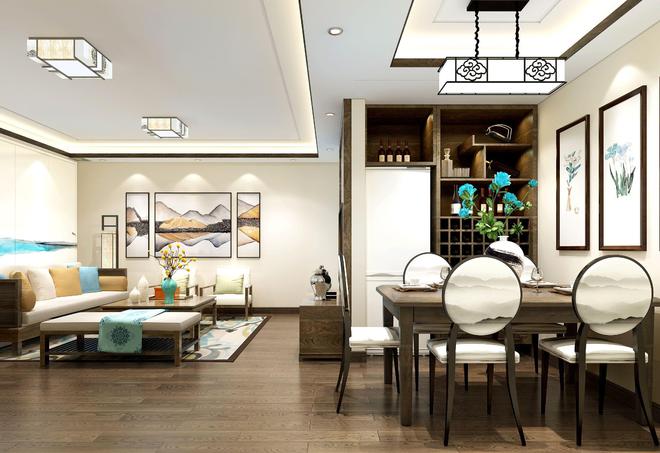Traditional Harmony
The dining room is a social, sacred place where we recount our tales, interact with loved ones, share and unwind from our daily activities. According to Chinese tradition, diners should not be distracted from the food or the company during a meal, as eating feeds both the body and the spirit. So make sure your dining room decor isn't too eye-catching, but is still bright and stimulating enough to whet the appetite. Equally, dull and muted tones will do little to enhance a joyous, social atmosphere.
The dining room is considered the center of wealth in the household, and mirrors in the dining room are a good idea - the food on the dining table appears doubled, symbolizing abundance for the household. Reflective materials can be used to reflect the scenery, garden or food, adding lightness and fluidity. But avoid overusing mirrors and reflective materials, as they can create a "sharp" atmosphere if incorrectly applied.
If there's only one entrance, allow enough space around it for easy access. Two doorways are usually best for optimum Qi flow. If the dining room is in close proximity to the kitchen, the family will be preoccupied with eating; guests will eat and run. People find defined room boundaries comforting, so use plants, screens, modular furniture to block distractions - the dining room shouldn't seem to "float" in a large area. This also applies to the living room.
Make sure the dining room isn't on a lower level than the kitchen or living room this is considered inauspicious. Seating is also very important - high - backed chairs with arms are preferable. He should be comfortable, so diners take their time to eat, digest well and communicate. An even number represents luck; single chairs represent loneliness.
Round or octagonal tables are preferable to square or rectangular shapes, and sideboards should be positioned so that edges don't point at the dining table. And finally, make sure the dining table isn't under a beam.
Modern Design
Ideal Feng Shui objects in the dining room are statues of Fu, Lu and Sau, the Chinese Gods of Health, Happiness and Prosperity. Place them on aside board with candles, flowers or crystals. Movement and activity reinforce the prosperity symbolically consumed in this room, so fill the room with music or place your child's play area nearby. Colors should be bright and stimulating. Try having a feature wall in red or hot pink; yellow and gold are also effective.
Paintings of fruit, flowers or food are good Feng Shui, while hunting scenes are bad Feng Shui because they depict death and decay. Antique hand-painted furniture is a good alternative to paintings, as detailed scenes often depict abundant feasts, rural harvests or grape picking. And if these are painted in gold, it will do much to increase wealth in the home.
Make sure your China matches, and never use cracked or chipped plates. Put a mirrored wall in, to reflect the food on the dining table. Mirrors area dynamic way of drawing light into the home, increasing space and reflecting views. Reflectivity is not just restricted to wall mounts mirrored consoles, drawers and sideboards are also available.
A well - lit - either naturally or artificially - dining room will ensure the flow of energy, as will good ventilation. Lighting should be chosen with care to complement the food and not cast shadows over the table. Candles can be romantic, but make sure they are not too tall and don't get in the way.
Reflective materials and mirrors are very powerful Feng Shui tools when applied in the dining room - but avoid their overuse as they have the potential to create a "sharp," bustling atmosphere. The dining room is the center of wealth in the household, so applying reflective surfaces, such as this floor to ceiling feature mirror, can create the beneficial illusion of doubling the food on the dining table. If a floor to ceiling mirror doesn't appeal to you, try a long, framed mirror that runs the length of the table.
Use dining room décor that isn't too visually noisy, yet stimulating enough to sharpen the appetite, tease the senses and get the conversation flowing. Remember, monochromatic tones won't do much to enhance the joys of the table - go for bright colors instead.
The mirror in this dining room has been applied auspiciously, as it reflects the entire dining table (food, abundance and color); it also reflects the views and allows ample light in. The rectangular shape of the room, and the rectangular dining table, with chairs to match, are also very good Feng Shui. Seamless storage has been incorporated into a wood-paneled wall, effectively reducing clutter.

